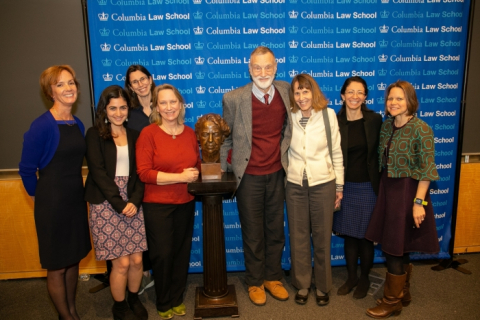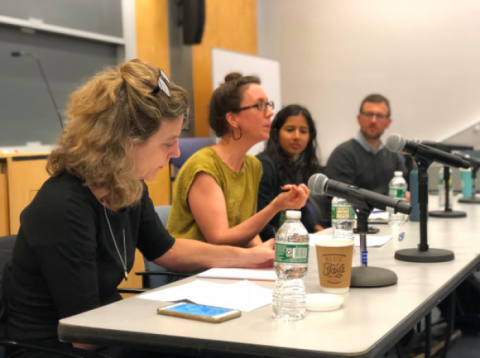Human Rights Institute Concludes 20th Anniversary Series:Resist, Decolonize, Create
New York, June 18, 2019 — The Human Rights Institute (HRI) concluded a year-long event series titled “Resist, Decolonize, Create,” commemorating 20 years since its founding by Professor Louis Henkin as an anchor for human rights within Columbia Law School. The series featured an exploration of tactics by leaders in the human rights field to resist abuse, create opportunities to expand justice, and decolonize the human rights field, while celebrating and sharing HRI’s groundbreaking work.
HRI's Managing Director Maya Alkateb-Chami expressed the importance of holding public programs and discussions on human rights in the current political climate: “Human rights, social justice, and basic freedoms face increasing threats from authoritarianism and xenophobia, environmental exploitation, inequality, poverty, and war. This series was designed with that in mind, aiming to build bridges between scholarship and activism to address mounting threats to human rights, develop capacity within the legal community, and model new strategies for progress,” Alkateb-Chami said.
The series featured leading advocates, practitioners, and academics in the human rights field, including Former UN High Commissioner for Human Rights Zeid Ra’ad Al Hussein; UN Special Rapporteur on the Human Rights of Migrants Felipe Gonzalez Morales; Executive Director of WITNESS Yvette Alberdingk-Thijm; and Mayor of Jackson, Mississippi Chokwe Antar Lumumba.
HRI’s 20th anniversary was also marked by the unveiling of a bust of Eleanor Roosevelt, gifted to Columbia Law School in recognition of her contribution to human rights. The unveiling was part of a special event titled “70 Years of the UDHR: Human Rights Today.” As the Chair of the UN Human Rights Commission, Roosevelt was a driving force behind the creation of Universal Declaration of Human Rights, which inaugurated the modern international human rights system.

Members of the HRI team pose with Eleanor Roosevelt’s grandchildren and their families at an event commemorating the 20th anniversary of the Universal Declaration of Human Rights and Roosevelt’s contribution to it. From left to right: Sarah Cleveland; Maya Shemtov; Phoebe, Laura, Frank, and Grace Roosevelt; Maya Alkateb-Chami; and JoAnn Kamuf Ward.
The topics of the series showcased HRI’s areas of groundbreaking work through analyses of the human rights field as well as regionally-focused case studies. Some of the talks analyzed the structures of and practices within the human rights field, with topics such as building sustainable movements, using people-centered approaches to activism, harnessing technology as a tool for justice, contrasting human and civil rights, and exploring effective disruptions of the field. Other events illustrated applications of human rights frameworks to regionally-focused case studies, such as employment rights for refugees in Jordan and Ethiopia; activism for LGBTQ rights in challenging contexts, discriminatory citizenship in Assam, India; and the use of forensic analysis as a tool to identify missing migrants on the US-Mexico border.
In a program featuring a conversation between Former UN High Commissioner for Human Rights Zeid Ra'ad Al Hussein and Former U.S. Ambassador to the Human Rights Council Keith Harper, the speakers discussed the U.S.’s retreat from international human rights mechanisms and the implications for the global protection of human rights. Al Hussein warned that we are living at a time when chauvinistic nationalism is on the rise, encouraging political leaders to speak up.
Mayor Chockwe Antar Lumumba of Jackson, Mississippi discussed his innovative approach to governance, which brings local communities to the center of political processes. Running on the platform of “when I become mayor, you become mayor,” he shared at the public program that “a radical is… a person who seeks change. If we look into our communities and see a need for change, we need to be prepared to be as radical as necessary.”

An interdisciplinary panel on mental health and resilient advocacy featured perspectives from law, psychology, and the field, with a discussion between WITNESS’s Yvette Alberdingk-Thijm, Columbia Law School’s Sarah Knuckey and Gulika Reddy, and the New School’s Adam Brown.
The series was co-sponsored and implemented in partnership with the Columbia Law school's Francis F. and Catherine Randolph Speakers Fund, Center for Gender and Sexuality Law, Human Rights Law Review (HRLR), Society for Immigration and Refugee Rights (SIRR), Columbia Society of International Law (CSIL), Rightslink, Student Public Interest Network (SPIN), Coalition of Identity Group Leaders, Women’s Association, Latin American Law Students Association, and Middle Eastern Law Student Association, in addition to the Columbia School of International and Public Affairs (SIPA) Human Rights Working Group, and Migration Working Group. For more information about the series and a full list of events, click here.
###
The Human Rights Institute advances international human rights through education, advocacy, fact-finding, research, scholarship, and critical reflection. We work in partnership with advocates, communities, and organizations pushing for social change to develop and strengthen the human rights legal framework and mechanisms, promote justice and accountability for human rights violations, and build and amplify collective power.
Founded in 1998 by the late Professor Louis Henkin as the anchor for human rights within Columbia Law School, the Human Rights Institute promotes engagement and knowledge of human rights within the law school, throughout the University, and around world. Across the many substantive areas of its work, the Institute builds bridges between scholarship and activism, develops capacity within the legal community, engages governments, and models new strategies for progress.
Join us on Facebook: Columbia Law School and Human Rights Institute
Follow us on Twitter: @columbialaw and @CLSHumanRights
